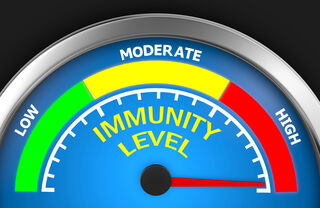Health
Find Meaning, and Boost Your Immunity
Immunology and the pursuit of meaning.
Posted February 13, 2022 Reviewed by Jessica Schrader
Key points
- There is evidence that positive thinking is correlated with health and wellness and could help boost immune response.
- The search for meaning may provide a motivational force that can be used both to sustain and boost natural immunity.
- It is important to understand how the mind and body can affect each other.

Against the backdrop of the coronavirus, I recently posted a call to advance health and well-being on the LinkedIn platform that elicited just under 400,000 views, over 3,500 positive reactions, and almost 400 insightful comments. My intention with this particular LinkedIn post was essentially to encourage a shift in consciousness and conversation—from a panic-driven, reductionist model of disease management to an integrative approach to illness prevention and psycho-body well-being that is grounded in our natural immunity. Sadly, recommendations to boost natural immunity have received scant attention from the government and legacy media over the past two years even though they are needed more than ever. “Better living through chemistry,” we have found out, has its limitations.
Broadly speaking, the best defense against disease, illness, and sickness is a strong immune system.1 Natural immunity is a real phenomenon and, importantly, can be boosted through conscious and responsible action. This means that we must put our minds to increasing our immunity and take action for such an improvement to occur. To be sure, this often can be easier said than done.
“It is said: where there is a will there is a way; I add, where there is an aim, there is a will.”—Viktor Frankl (Emphasis added)2
The most common prescriptions or recommendations to boost the natural immune system include the following: good nutrition, including limiting sugar intake; productive sleep and restorative rest; adequate hydration, especially drinking plenty of water; physical exercise, including walking and other forms of movement; regular exposure to sunlight; stress reduction techniques, including mindfulness and meditation practices, as well as breathing exercises that also help to increase lung capacity; and maintaining social contacts—in-person, by telephone, or “virtual” (e.g., online). For optimal results, these measures should be pursued holistically, in tandem rather than in isolation.
Although most of this advice is centered on physiology, there are also suggestions on the list that deal primarily with psychological well-being, which is recognized as an important part of the human immune system.3 There is evidence that positive thinking not only is correlated with health and wellness but also serves to boost the immune response.4 A similar finding has been described between optimism and immunity.5 According to the psychiatrist, Holocaust survivor, and author of Man’s Search for Meaning, Viktor E. Frankl, true optimism is a higher-order concept and has more influence on health and well-being than does positive thinking alone.6
Frankl famously espoused that the search for meaning is the primary, intrinsic motivation of human beings. This argument is especially important since it firmly grounds the list of recommended measures to boost immunity in a meaning-centric context. The search for meaning, regardless of personal circumstances, has been found to be intimately related to and positively influencing health status at all levels—spiritual, emotional, mental, and physical. This fundamental relationship between meaning and health, because it originates from intrinsic rather than extrinsic sources, can enable individuals to remain fully engaged in and build their personal resilience against whatever challenges or obstacles they face in life, including the need to boost their immunity against disease, illness, and sickness.7
Demystifying the concept of “meaning” has plagued philosophers, psychologists, allied professionals, and laypeople for generations.8 While many people define meaning as “significance” or “something that matters,” my colleagues and I delve deeper. From an existential perspective, we define meaning as “resonance with our true nature or core essence.”9 Put differently, when something feels significant or we know that it matters, it is because it resonates with who we truly are. Core essence is what defines us and is at the heart of what makes us unique as human beings.
As introduced in his book, Man’s Search for Meaning, Frankl developed a meaning-focused, humanistic system of psychotherapy called “Logotherapy and Existential Analysis,” which came to be known as the “Third Viennese School of Psychotherapy." Extending well beyond their clinical applications, the core principles of Frankl’s psychotherapeutic approach provide practical advice to advance the human quest for meaning among the general public.
To Frankl, the search for meaning is a manifestation of being truly human. In his own words, “No ant, no bee, no animal will ever raise the question of whether or not its existence has a meaning, but man does. It’s his privilege that he cares for a meaning to his existence. He is not only searching for such a meaning, but he is even entitled to it. ... After all, it’s a sign of intellectual honesty and sincerity.”10
Against this backdrop, the search for meaning may provide a motivational force that can be used both to sustain and boost our natural immunity against disease, illness, and sickness. By connecting authentically with others, engaging with deeper purpose, and embracing life—all of life—with an appreciative attitude, we not only ensure that we find meaning in our lives but also build our innate capacity to promote our health and well-being as a natural byproduct of the search.11
There is increasing evidence that finding meaning is associated with and, importantly, serves as a predictor of positive health status outcomes. An empirical study reported in the Annals of Behavioral Medicine found that increases in meaning-related goals were associated with changes in immune function, specifically with increased natural killer cell cytotoxicity, among participants in a bereavement-related disclosure intervention. The results of this study suggested that prioritizing goals emphasizing relationships, personal growth, and striving for meaning in life may have positive biological correlates.12
The bottom line is that the more we understand how the spirit, mind, and body affect each other, the more we’ll be able to recognize why good mental health is vital for our natural immune system. It is time to leverage the human quest for meaning as a powerful motivational force driving psychological well-being along with the other prescriptions to boost our immune response against disease, illness, and sickness. In this way, we’ll be able to move from a panic-driven, reductionist model of disease management to an integrative approach to illness prevention and psycho-body well-being that is grounded in our natural immunity.
References
1. For the conceptual distinctions between disease, illness, and sickness, see: Kenneth M. Boyd (2000). “Disease, illness, sickness, health, healing and wholeness: exploring some elusive concepts,” Journal of Medical Ethics: Medical Humanities, June 2000, Vol. 26, No. 1, pp. 9–17.
2. Alex Pattakos and Elaine Dundon (2017). Prisoners of Our Thoughts: Viktor Frankl’s Principles for Discovering Meaning in Life and Work, 3rd edition. Oakland: Berrett-Koehler Publishers, p. 150.
3. Abdurachman and Netty Herawati (2018). “The Role of Psychological Well-Being in Boosting Immune Response: An Optimal Effort for Tackling Infection,” African Journal of Infectious Diseases, Vol. 12, No. 1 (Supplement), 7 March 2018, pp. 54-61. See also: Tanu Gupta and Naresh Nebhinani (2020). “Let's Build the Psychological Immunity to Fight Against COVID-19.” Indian Journal of Psychiatry, Vol. 62, No. 5, pp. 601-603.
4. Kendra Cherry (2020). “Benefits of Positive Thinking for Body and Mind,” Verywell Mind, June 1, 2020: https://www.verywellmind.com/benefits-of-positive-thinking-2794767; See also: Johns Hopkins Medicine (2022). “The Power of Positive Thinking,” https://www.hopkinsmedicine.org/health/wellness-and-prevention/the-powe…
5. Suzanne C. Segerstrom (2005). “Optimism and Immunity: Do Positive Thoughts Always Lead to Positive Effects?” Brain, Behavior, and Immunity, Vol. 19, No. 3, May 2005, pp: 195-200; and Stephanie Pappas (2010). “Optimism Boosts Immune System,” LiveScience, March 25, 2010: https://www.livescience.com/8158-optimism-boosts-immune-system.html.
6. For the definition and attributes of “true optimism,” see: Alex Pattakos and Elaine Dundon (2017). Prisoners of Our Thoughts: Viktor Frankl’s Principles for Discovering Meaning in Life and Work, 3rd edition. Oakland: Berrett-Koehler Publishers, pp. 32-36.
7. See, for example: Center for the Advancement of Health (2003). “Searching for Meaning in Life May Boost Immune System.” ScienceDaily, 29 April 2003. www.sciencedaily.com/releases/2003/04/030429083520.htm.
8. For example, tracing the human quest for meaning to the ancient Greeks, see: Alex Pattakos and Elaine Dundon (2015). The OPA! Way: Finding Joy & Meaning in Everyday Life & Work. Dallas: BenBella Books.
9. Alex Pattakos and Elaine Dundon (2017). Prisoners of Our Thoughts: Viktor Frankl’s Principles for Discovering Meaning in Life and Work, 3rd edition. Oakland: Berrett-Koehler Publishers, pp. 159-161. Our definition of meaning, it should be noted, is one of the pillars of the discipline of MEANINGology®, the “study and practice of meaning in life, work, and society, “ that, among other things, is the subject of a forthcoming book coauthored by Elaine Dundon and Alex Pattakos.
10. Viktor E. Frankl (1986). The Doctor and the Soul: From Psychotherapy to Logotherapy. New York: Random House, p. 26.
11. Connecting authentically with others (O), engaging with deeper purpose (P), and embracing life—all of life—with an appreciative attitude (A), taken together, comprise the Greek-inspired concept of “OPA!” that was introduced initially in our award-winning book, The OPA! Way, incorporated as an extension of Viktor Frankl’s psychotherapeutic approach in the 3rd edition of our international bestselling book, Prisoners of Our Thoughts, and built into the foundation of the discipline of MEANINGology®.
12. Julienne E. Bower, et al. (2003). “Finding Positive Meaning and Its Association with Natural Killer Cell Cytotoxicity Among Participants in a Bereavement-Related Disclosure Intervention.” Annals of Behavioral Medicine, Vol. 25, No. 2, April 2003, pp. 146-155. See also: Julienne E. Bower, et al. (2005). “Perceptions of Positive Meaning and Vulnerability Following Breast Cancer: Predictors and Outcomes Among Long-Term Breast Cancer Survivors.” Annals of Behavioral Medicine, Vol. 29, No. 3, June 2005, pp. 236-245.




